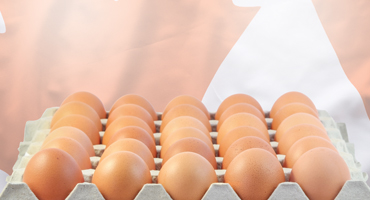Mark of ‘egg’cellence
May 14, 2019
New industry-wide initiative assures Canadian consumers of the quality of their eggs
CANADIANS already trust the quality and freshness of the food they eat every day. But a recent Egg Quality Assurance (EQA) initiative launched by Egg Farmers of Canada (EFC) sets out to prove it with a mark of certification right on the carton.
Canadian Retailer sat down with EFC’s CEO Tim Lambert to talk about the EQA initiative, its objectives, the benefits to both consumers and retailers, and how retailers who sell eggs can make sure they proudly highlight and celebrate the exceptional quality of their eggs with the EQA mark.
Canadian Retailer: What exactly is the EQA initiative and what’s involved in recognizing eggs under this mark?
Tim Lambert: For years we’ve had on-farm programs, like the Start Clean-Stay Clean and Animal Care Programs, that ensure the quality of the eggs produced and the welfare of the animals. These programs have been highly effective and have evolved as we put continuous effort into building on public trust with the Canadian consumer. The EQA program is about formalizing what we’ve already been doing under one umbrella quality assurance program that showcases high-quality Canadian eggs and the commitment of Canadian farmers to deliver the best eggs possible. The certification is a recognizable mark on the egg cartons themselves and assures for the consumer buying them that a) the eggs were produced by Canadian egg farm families, and b) they’ve been produced to the highest possible food safety and animal welfare standards.
CR: What kind of process is involved in gaining certification from the EQA program?
TL: To gain certification, every farm is inspected to meet the standards of each national program, which are based on best practices and scientific input. In addition, our programs are audited by third party service providers to make sure that we are in fact delivering to those standards.
CR: What’s driven the need for EQA standards? What are consumers asking for when it comes to their eggs?
TL: Consumers want to know more about where their food comes from. They’re more urbanized today and have less of a connection to the farm. To help re-establish that connection, we needed to communicate what we’re doing and our exceptionally high standards around food safety and animal care. We know that Canadians trust the food they eat. Canada is well known to have high standards. But the EQA mark backs it up for the consumer with something visual.
“The future belongs to businesses and organizations that recognize the need to build public trust and be transparent with customers.”
TIM LAMBERT
Egg Farmers of Canada
It lets them know that the eggs they’re eating were produced at the highest possible standard. The programs we have in place are there to ensure the health of Canadians. But they also go a long way to help reduce food waste and enhance sustainability at the farm level. Similarly, good welfare improves productivity and efficiency. As a result of all this, we have a fantastic opportunity to build trust in our product and to continue to be transparent and focused on doing the right things for the right reasons. This vision is central to our business plan. The future belongs to businesses and organizations that recognize the need to build public trust and be transparent with customers.
CR: How can retailers adopt the EQA logo on their egg cartons?
TL: Retailers interested in adopting the EQA mark can visit eggquality.ca to learn more about the initiative and our programs as well as how to access the EQA mark.
CR: How important is it for retailers to adopt the EQA mark on their cartons, and what are the benefits available to them as a result of doing so?
TL: It’s critical for retailers to display the EQA mark on their cartons. We’re living in an age where consumers are well educated about the product they want to buy, where it comes from and how it was produced. To build their trust in what you do, you need to back up your claims with some evidence that you’re actually doing it. It’s all about believing in your product, standing behind it and backing it up.
BY SEAN C. TARRY



